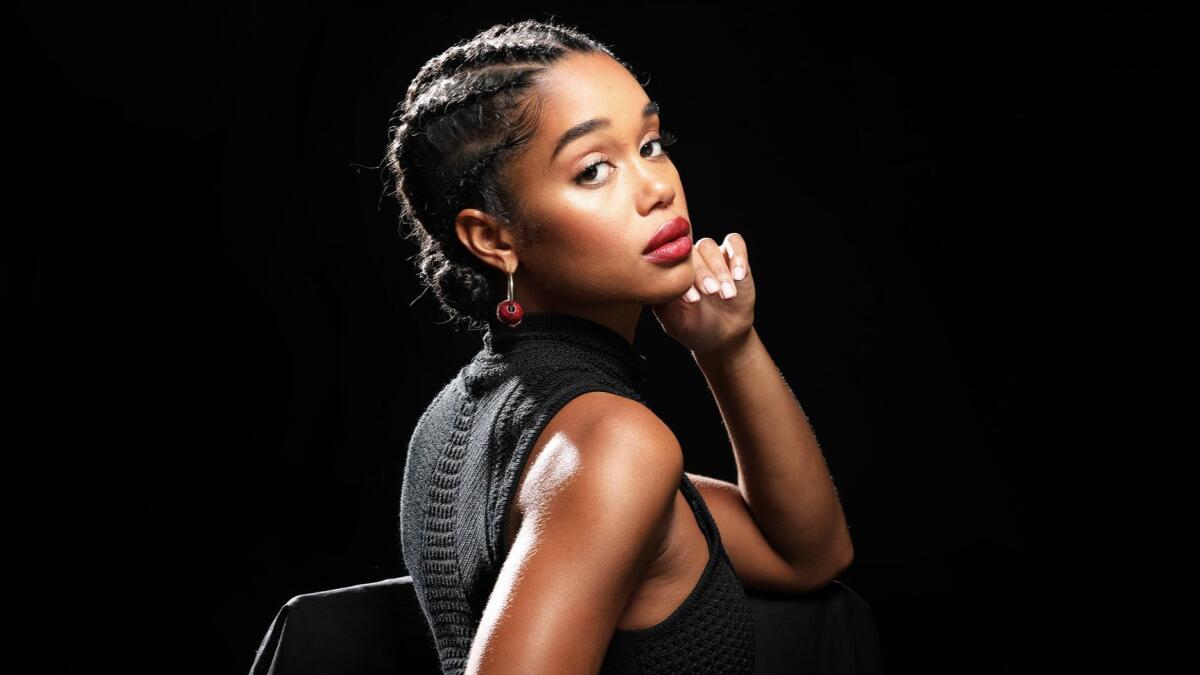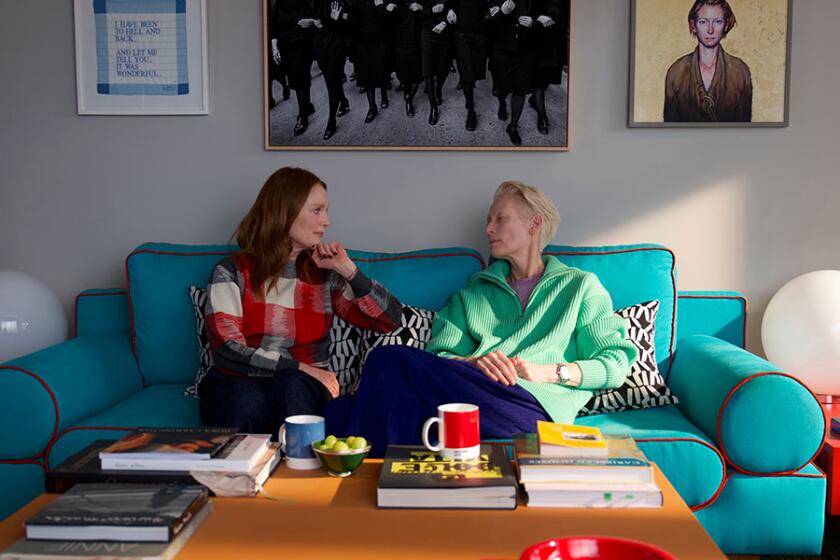Q&A: Don’t ask ‘BlacKkKlansman’ actress Laura Harrier about being a black woman in Hollywood

In preparation for her role as Patrice Dumas, a ’70s-era student activist who catches the eye of detective Ron Stallworth in Spike Lee’s “BlacKkKlansman,” it was crucial for actress Laura Harrier to understand the soul of her character.
“I watched a ton of ‘Soul Train,’” she said with a laugh. “I tried to dance like them and failed miserably.”
Getting lost in “‘Soul Train’ YouTube holes” to find that distinctive ’70s groove was just the tip of the iceberg for the “Spider-Man: Homecoming” actress. Her extensive research process included conducting original interviews, watching the documentary “The Black Power Mixtape” with director Lee and co-star John David Washington, brushing up on blaxploitation films (including “Cleopatra Jones” and “Coffy”) and writing an autobiography of her character (at Lee’s insistence).
“Spike gave me a whole reading list,” she said. “It was like being back in college.”
While Stallworth (Washington) is the titular hero — a Colorado Springs cop who goes “undercover,” with the help of a white colleague (Adam Driver), to infiltrate the Ku Klux Klan (and, yes, the movie is based on a true story) — Harrier’s Dumas is arguably the picture’s beating heart. Her activism bears a clear connection with today’s Black Lives Matter movement, and her unforced romance with Stallworth (their relationship is a cinematic flourish) lends the explosive film some of its most intimate moments.
The 28-year-old admits that starring in her first period movie was “daunting,” but it was important to be able to imagine herself in the culture. “I only listened to music from the early ’70s for the duration of filming, which was really fun,” she said.
The Times caught up with Harrier on the morning of the Los Angeles premiere, just a few days before the film’s Aug. 10 opening, to discuss working with Lee, her thoughts on the current administration and the question she hates being asked on the red carpet.
Had you been a fan of Spike Lee prior to this film?
Yeah, definitely. I grew up watching his movies… I think I saw “Do the Right Thing” when I was in high school. His movies changed the way I saw movies. It was sort of the first time I realized a director’s specific vision and how their view of the world can [be expressed through film and] shape so many other people’s views of the world. It was the first time I realized what an auteur is; I saw those movies and I was like, “I want to see more of this person’s movies.”
So what’s your favorite Spike Lee joint?
I mean, “Do The Right Thing” is such a cliche answer but … [laughs] Obviously, “Malcolm X” too. I also love “School Daze.” I love “25th Hour.” And I really like our movie.
What was it like working with him?
It was kind of crazy. At first, it was definitely intimidating and really surreal to just be on set. But once you get to know him, and he gets to know you, he’s really nurturing as a director. I felt really comfortable. He’s collaborative too; everyone’s ideas are welcome ... I just respect him so much as a filmmaker and as a person.
Do you think there’s many opportunities in Hollywood for black women to play strong characters like Patrice?
Mmm, no [laughs]. So I’m really thankful to be able to play this person and lend my voice to this story. I think we’re seeing more opportunities, but it’s really few.
What did you find special about the role?
When you talk about black power and the Black Panther movement, it’s always this really male-driven thing. And I don’t think we’ve seen the female face of that on-screen before, at least that I’m aware of. So it’s exciting to play that side of it. At the height of the Panthers, the majority of members were women, and no one ever talks about that. The only name we hear is Angela Davis, who was a huge figure, but there were so many women working for the movement. I just wanted to pay homage to them and give them the respect I think they deserve.
Your character doesn’t exist in the book the film is based on. Where did you draw inspiration from?
From these various women. I got to meet Kathleen Cleaver, which was really cool. Spike had us all over to his house, and she was there, and I got to ask her a bunch of questions about her life and her relationship with [Black Panther leader] Eldridge [Cleaver] and how she got to where she was. That was really influential. I read a bunch of Angela Davis’ books, watched a lot of interviews. And then I contacted the Colorado College Alumni Assn. to talk to people who were in the Black Student Union in the early ‘70s. [I asked] like, “Why were you at Colorado College as a black person in the early ‘70s? How did you get there?” and all that stuff. I tried to draw from all these different influences to create someone who felt of the time and multidimensional. It was kind of like Spike and I together figuring her out.
What do you hate being asked by journalists?
I hate being asked what’s it like being a black woman in Hollywood. Because I don’t … know, this is my only experience. I hate always having to speak on what it’s like to be black. As a black person, that’s all we know, so I don’t know why it’s constantly this almost justification of, “Why are you here?”
Right. Like no one’s being asked how does it feel being a white woman in Hollywood.
Exactly. Never. And also like, “So you and your contemporaries...” we’re always being compared to each other. I wish that I could just exist as myself and it wasn’t questioned.
Who do you think the intended audience for “BlacKkKlansman” is and what do you hope they take away from it?
I hope everyone can watch this film and take a different message away. I really think this movie isn’t just about being black and white in America. Obviously, that’s the story that we’re telling, but there’s a rise of right-wing movements all over the world, and I think people everywhere can learn something from this. Like, how do people in other countries treat Muslims and immigrants? That’s what we’re really talking about: love and hate. I wouldn’t tell people what to think, but I hope that they question our current administration and see the wrongs that they’re committing.
What are your thoughts on our current administration?
I disagree with absolutely everything they’re doing.
If you could pick one member of the Trump family to watch “BlacKkKlansman” with, who would it be?
Ugh. I don’t want to hang out with any of them. I have no desire to be near any of those people.
What projects are you working on next?
I’m figuring it out. I really have been focused on this, and I just want my next thing to be something I’m as passionate about, so I’m trying to be picky.
Do you get to be in the next Spider-Man movie?
I can’t tell you that. [Laughs] I’m sorry.
follow me on twitter @sonaiyak
More to Read
Only good movies
Get the Indie Focus newsletter, Mark Olsen's weekly guide to the world of cinema.
You may occasionally receive promotional content from the Los Angeles Times.











